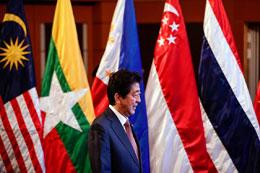Southeast Asians confident Japan will “do the right thing”

Japan is the most trusted major power among Southeast Asian nations today as the region becomes a staging ground for a major power struggle between the United States and China.
A survey of professionals by Iseas-Yusof Ishak Institute’s Asean Studies Centre released last week found that attitudes have shifted in Japan’s favour — becoming the most trusted major power among Southeast Asians today.
Respondents from the 10 Asean (Association of Southeast Nations) member states took part in the targeted online poll entitled The State of Southeast Asia, with more than 1,300 professionals from the fields of research, business and finance, public sector, civil society and the media responding. This is the second year the survey has been conducted.
Some 61.2 per cent said they were confident Japan will “do the right thing” in contributing to global peace, security, prosperity and governance in the 2020 edition of the survey.
While this dipped slightly from the 65.9 per cent in the previous year, the study noted that Japan is the only major power that achieved an overall confidence vote above 50 per cent.
A key finding in the report showed that the majority of Southeast Asians are not confident in China’s Belt and Road Initiative, with 64% of respondents saying they have little or no confidence in China's approach to project loans.
The survey also showed that 47 per cent of respondents had little to no confidence in the US’ ability to be a strategic partner and a provider of national security, up from 34.6 per cent who felt that way last year.
“If the US is perceived to be increasingly taking a back seat in regional security, who can the region turn to for new partnerships?,” the study asked.
In response, 31.7 per cent picked Japan, while 20.5 per cent selected the EU and 20.3 per cent chose China. More than 600 survey participants indicated that they had little to no hope in US’ reliability.
Japan also came first in another question on broadening Asean’s strategic options, with the researchers noting that Asean member states have hedged against the uncertainties of the US-China rivalry by expanding their strategic options beyond the two superpowers.
The survey illustrated the U.S.-China standoff and how it is affecting allegiances in the region, with respondents fairly evenly split over which side ASEAN should choose if forced to align with one of the two countries: 54% opted for the U.S. while 46% preferred China, reported the Nikkei Asian Review.
China was given the nod by the majority of respondents from seven of the 10 ASEAN countries, with 69% from Brunei favoring the country, 58% from Cambodia, 52% from Indonesia, 74% from Laos, 61% from Malaysia, 62% from Myanmar and 52% from Thailand.
The U.S. was the overwhelming choice among respondents from the Philippines and Vietnam at 83% and 86%, respectively, followed by 61% from Singapore. The strong support shown by the Filipino and Vietnamese respondents appears partly due to ongoing maritime squabbles their countries have with Beijing over the South China Sea.
"The take-away from this split response is clear: ASEAN must do all it can to avoid making a binary choice between the U.S. and China, or even putting that choice on the table," said Hoang Thi Ha, researcher at the think tank, in an email interview with the Nikkei Asian Review.
The report comes as Vancouver plays host this week to an international conference to facilitate a dialogue on geopolitical issues in the Indo-Pacific - an emerging geopolitical construct that extends from the Indian Ocean to the Pacific.
The Free and Open Indo-Pacific: Charting a Common Approach international conference, the first of its kind in Canada, is hosted by the Asia Pacific Foundation of Canada, with the support of government and private sector partners.
The invitation-only forum will serve as a venue for informed scholarship and policy discussion to develop a strategy and response to regional issues surrounding the Indo-Pacific, said Asia Pacific Foundation of Canada.
The keynote presentation will feature Admiral (Retired) Scott Swift, Former Commander, US Pacific Fleet.
The ISEAS-Yusof Ishak Institute is an autonomous organisation established in 1968. It is a regional centre dedicated to the study of socio-political, security and economic trends and developments in Southeast Asia and its wider geostrategic and economic environment.
The following are some of the highlights of its 2020 survey:
1. Domestic political instability, economic downturn and climate change are the most pressing concerns in the region.
2. Regional countries are concerned about major power competition and the fear that some members may become proxies of a major power.
3. A third of respondents believe Asean should continue with its position of "not taking sides"in the US-China rivalry to fend of pressure from the powers.
4. Over half of the respondents will go for the US if they are forced to choose between the two major powers. However, countries like Malaysia, Thailand and Indonesia favour China over the US.
5. China is seen as the most influential economic and political-strategic power in the region, outpacing the US by a significant margin.
6. The region's confidence in the US as strategic partner and provider of regional security is low.
7. Japan is the most trusted power in the region, followed by the EU, US and China.
8. Japan also shines in terms of education, tourism and language.
9. The EU is viewed favourably by Southeast Asian nations.
10. Most respondents believe the US-China trade war bodes ill for the global economy.
11. More than half of the respondents believe that RCEP membership should be expanded to "all qualified parties" in future.
12. Samsung is the most preferred telecommunications provider to build the region's 5G networks. Chinese companies are nevertheless preferred in countries like Malaysia and Cambodia.
– Mata Press Service with agencies









